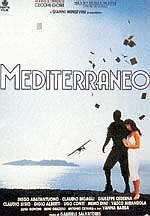Mediterraneo
| Mediterraneo | |
|---|---|
 original movie poster | |
| Directed by | Gabriele Salvatores |
| Produced by |
Silvio Berlusconi Mario Cecchi Gori Vittorio Cecchi Gori Gianni Minervini |
| Written by | Enzo Monteleone |
| Starring |
Diego Abatantuono Claudio Bigagli Giuseppe Cederna Claudio Bisio |
| Music by |
Giancarlo Bigazzi Marco Falagiani |
| Cinematography | Italo Petriccione |
| Edited by | Nino Baragli |
| Distributed by | Miramax Films |
Release date |
|
Running time |
96 minutes
|
| Country | Italy |
| Language |
Italian English Greek |
Mediterraneo is a 1991 Italian film that won the Academy Award for Best Foreign Language Film in 1992.[1] The film is set during World War II and regards a group of Italian soldiers who become stranded on a Greek island, and are left behind by the war. The filming took place on the Greek island of Kastellórizo, in the Dodecanese island complex.
Plot
In 1941, one year after Italy joined Germany against the Allies in World War II, a small group of misfit Italian soldiers is sent to a small Greek island in the Aegean Sea for four months of lookout duty. The soldiers include a lieutenant who likes art, a macho sergeant, a farmer accompanied by his beloved donkey Silvana, and other quirky people. They are not very good soldiers, but a cross section of average, independent men.
The soldiers anticipate attack from outside and on the island, and take all sorts of inept precautions. They find a small town with no people. That night, they see bombing on the horizon and by radio interception, discover that the ship that was intended to pick them up has been destroyed. Mysteriously, people reappear in the village: the villagers say they hid because the Germans had taken all the men, but having seen that the Italians are absolutely harmless they have decided to return to their lives. It's not long before everyone's sunny nature appears. The Italian soldiers, unacquainted to a war they clearly do not sense as theirs are absorbed into the life, heat and landscape of the idyllic island.
The local orthodox priest asks the lieutenant, an amateur painter, to restore the murals in his church. Two soldiers, who are brothers, befriend a lovely young woman, a shepherdess. They eventually consummate their friendeship with the shepardess who in turn - loves them both equally. Sergeant Lo Russo, the only member of the crew with a fiery spirit for war, takes up folk dancing & begins to reflect on his place in the universe. Meanwhile, the most shy of the soldiers, Farina, falls in love with the island's prostitute, named Vasilissa[note 1].
In their old age three of the men are reunited on the island to close the film.[2]
Cast
- Diego Abatantuono as Sgt. Nicola Lo Russo
- Claudio Bigagli as Lt. Raffaele Montini
- Giuseppe Cederna as Pvt. Antonio Farina
- Claudio Bisio as Pvt. Corrado Noventa
- Luigi Alberti as Pvt. Eliseo Strazzabosco
- Ugo Conti as Pvt. Luciano Colasanti
- Antonio Catania as Lt. Carmelo La Rosa
- Memo Dini as Pvt. Libero Munaron
- Vasco Mirandola as Pvt. Felice Munaron
- Vana Barba (credited as Vanna Barba) as Vasilissa
Release
The film was a success at the box office.[3]
Reception
Roger Ebert stated that this was the only film he ever walked out of because it was "utterly without redeeming merit".[4]
Legacy
The film has been criticised for its portrayal of the Royal Italian Army during World War II[5] because it employs a comparable story arc to the Clean Wehrmacht myth that developed in post-war Germany. This was the belief that the Heer was noble and apolitical unlike the National Socialists and the SS.[6] The film uses the post-war Italian Republic narrative that "Italians are decent people" (Italiani, brava gente) compared to the ideologically-motivated and brutal Germans who persecuted and murdered Jews and other ethnic groups throughout occupied Europe.[5][7] Modern historians have now challenged this ideal, research has shown the "gentle Italians" belief was created to avoid "a public debate on collective responsibility, guilt and denial, repentance and pardon" for the Italian Army's actual historical conduct and behaviour during the Second World War.[5]
See also
Notes
- ↑ Vasilissa is the Greek word for queen.
References
- ↑ "The 64th Academy Awards (1992) Nominees and Winners". oscars.org. Retrieved 15 September 2015.
- ↑ Mediterraneo (1991). March 22, 1992. Review/Film Festival; Roundelay Of Love On an Isle In Wartime
- ↑ "Weekend Box Office : 'White Men' Outjumps 'Basic Instinct'". The Los Angeles Times. Retrieved 2011-06-06.
- ↑ Watson, Bret (17 May 1996). "Siskel and Ebert answer 10 Stupid Questions". Entertainment Weekly. Retrieved 1 July 2017.
- 1 2 3 Petrusewicz, Marta (2004). "The hidden pages of contemporary Italian history: war crimes, war guilt and collective memory". Journal of Modern Italian Studies. 9 (3): 269–70.
- ↑ Wette, Wolfram (2002). Die Wehrmacht. Feindbilder, Vernichtungskrieg, Legenden. Fischer, Frankfurt am Main. pp. 236–238. ISBN 3-7632-5267-3.
- ↑ Rodogno, Davide (2005). "Italiani brava gente? Fascist Italy's Policy Toward the Jews in the Balkans, April 1941–July 1943". European History Quarterly. 35 (2): 213–40.
External links
- Mediterraneo on IMDb